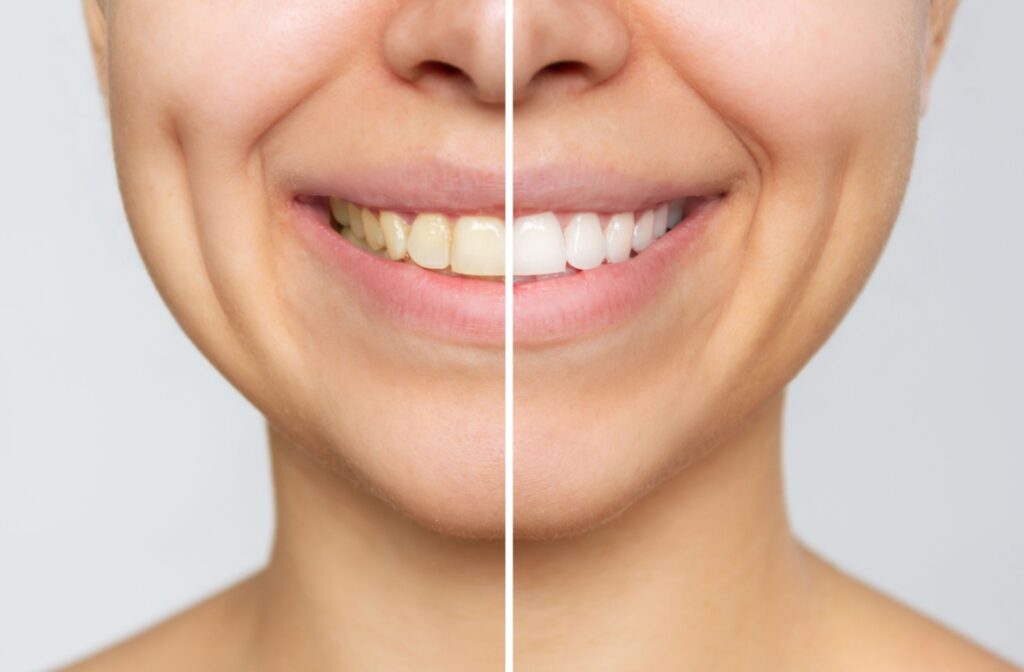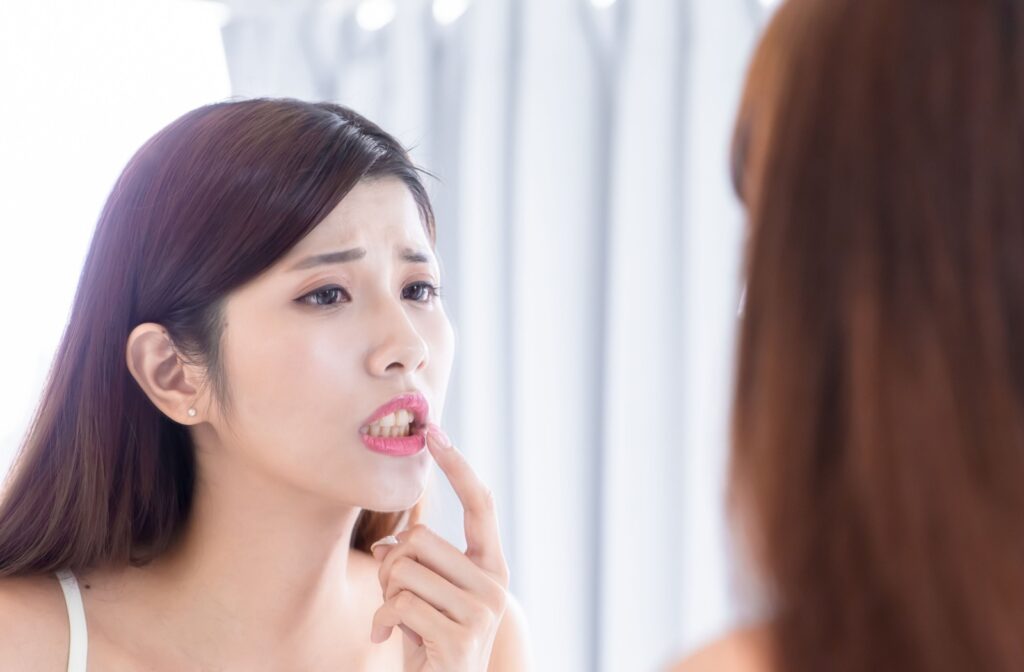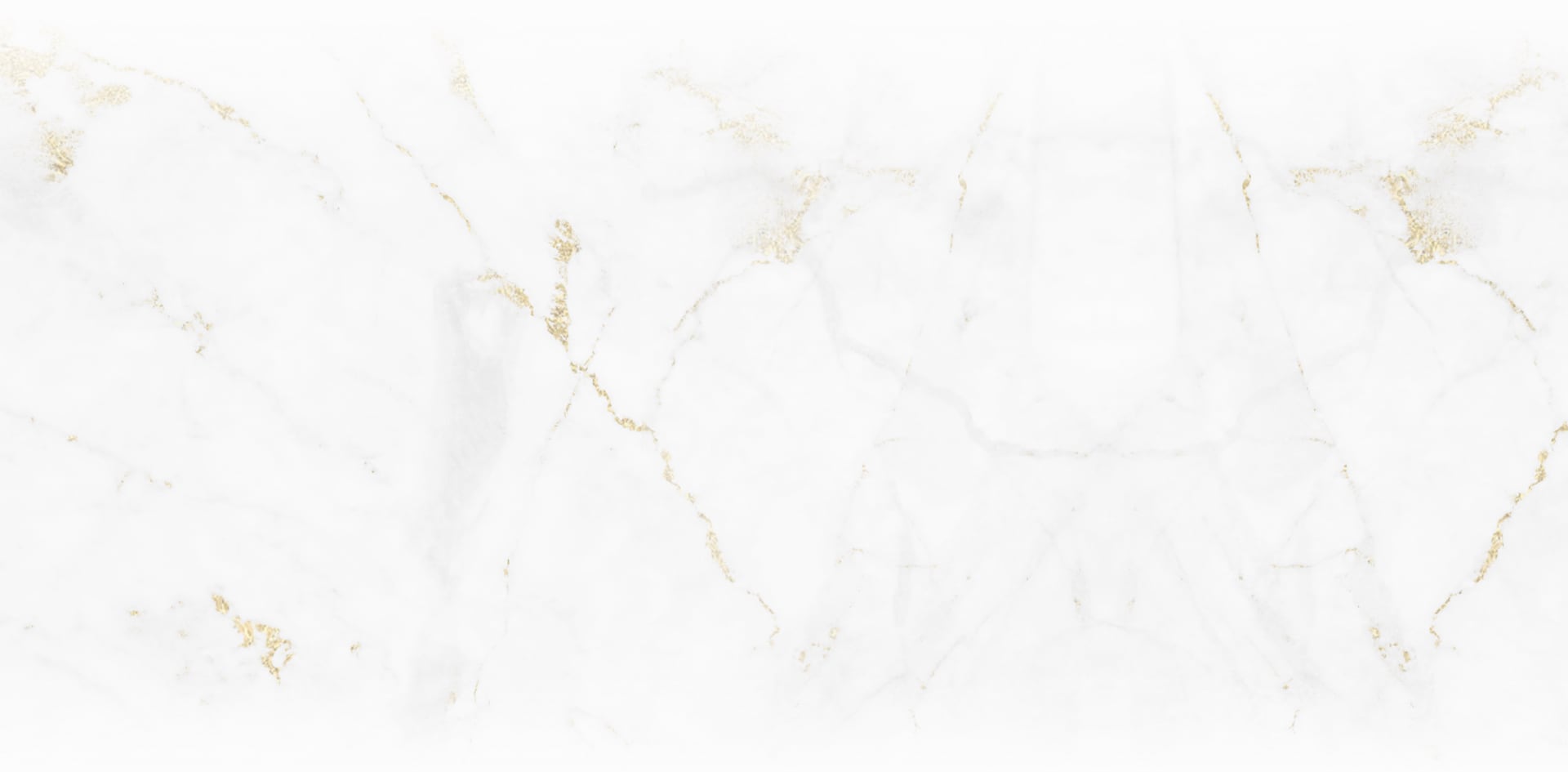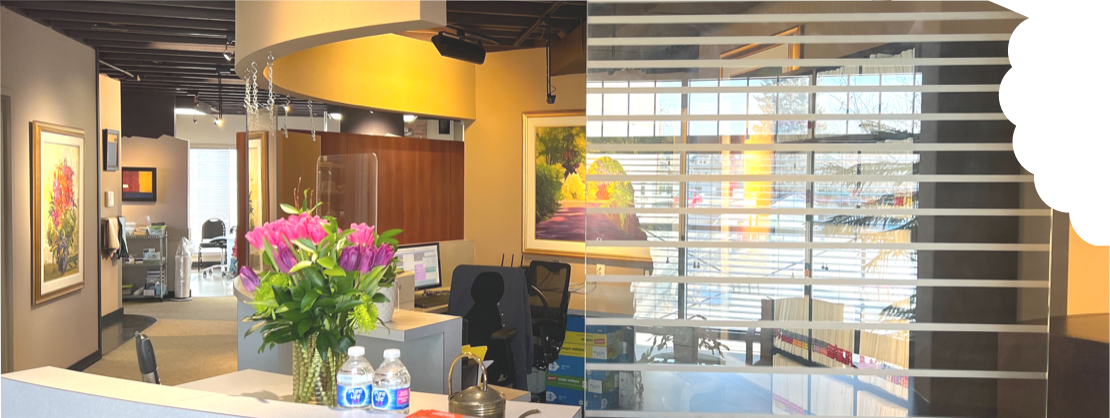Brushing and flossing your teeth daily can have many benefits. These tools are designed to keep your smile healthy and clean by removing particles that can lead to tooth decay and gum disease.
Routine brushing does not necessarily whiten teeth. Our teeth are typically naturally yellow and can become discoloured over time due to several factors.
Maintaining good oral hygiene helps keep dental concerns at bay, but they are not intended to whiten teeth. Teeth-whitening treatments are designed to remove stain particles and can improve tooth discolouration.
Our Teeth Are Naturally Yellow
It is not common for our teeth to be white naturally; they are typically naturally yellow! The visible portion of our teeth includes 2 structures: enamel and dentin.
Enamel is the hard outermost layer of the tooth. It is semi-translucent and is not perfectly white. It protects the inner layers of the tooth (dentin and pulp) from damage.
Dentin is the structure of the tooth underneath the enamel. Dentin can range from orange to grey but is usually a pale yellow. This yellow hue is the colour of our teeth that we see poking from underneath the enamel.
Differences Between Teeth Cleaning & Teeth Whitening
Oral hygiene is important to maintaining a clean, healthy, and beautiful smile. Brushing your teeth twice daily and flossing every day (or every other day) to remove any leftover plaque, food particles, and debris is encouraged.
Maintaining good oral hygiene means cleaning our teeth and removing plaque and bacteria to prevent dental concerns like cavities and tooth decay. Brushing and flossing are not teeth-whitening treatments that can remove stains and discolouration. However, teeth-whitening toothpaste can help remove staining and discolouration from the tooth’s surface.
Professional teeth cleaning by your dental team differs from cleaning your teeth at home. This treatment aims to remove plaque and tartar buildup around teeth and gums that accumulate over time. Teeth cleanings help prevent tooth decay and gum disease and can detect any serious dental concerns.
Teeth whitening is a cosmetic procedure that removes tooth stains and discolouration from the enamel to brighten and whiten the appearance of your teeth.
What Causes Tooth Discolouration?
While teeth are not naturally white, factors like aging, food, and lifestyle can increase tooth discolouration. As we age, our tooth enamel becomes thinner, exposing more of our yellowish dentin underneath. Teeth-whitening treatments can help remove staining and give teeth a bright white appearance.
There are typically 2 types of tooth stains:
- Intrinsic
- Extrinsic
An intrinsic tooth stain refers to staining that occurs below the tooth’s surface and affects the dentin. This occurs when stain-causing particles accumulate within the tooth’s enamel. Intrinsic stains are caused by factors that affect the internal structure of the tooth, such as:
- Oral injury
- Medications like tetracycline
- Excessive fluoride intake
Intrinsic tooth stains can be addressed with specialized treatments. Unfortunately, these stains cannot be removed using at-home teeth-whitening treatments.
Extrinsic tooth discolouration affects the surface of the tooth. These stains occur when staining particles cover the tooth’s enamel. Extrinsic tooth discolouration can be caused by:
- Food and drink: Coffee, tea, and red wines
- Lifestyle habits: Tobacco use, smoking, and vaping
Extrinsic tooth stains respond well to professional dental cleanings and teeth-whitening treatments.
Avoiding food and drinks that stain teeth can help improve further discolouration. If you have undergone any teeth-whitening treatments, staying clear of these staining agents can lengthen the results of your treatment.

Treatments for Teeth Whitening
There are 2 options for teeth whitening:
- At-home teeth whitening: This includes teeth-whitening toothpaste, mouthwash, baking soda, and whitening strips.
- Professional teeth whitening: Your dental team does these treatments. Results from these treatments are often quick and dramatic.
At-Home Teeth Whitening
Traditional toothpaste does not contain the active properties needed to break down pigment molecules and lift extrinsic tooth stains like traditional teeth-whitening treatments.
Baking soda is a natural treatment to remove extrinsic tooth discolouration. Baking soda is effective at removing tooth discolouration because it is a natural abrasive alkaline. It can also help reduce bacteria and acidity and limit the buildup of plaque.
At-home teeth-whitening treatments can provide gradual results. Depending on the treatment used and the extent of the staining, results can last from several weeks to a few months.
Professional Teeth Whitening
During professional teeth-whitening treatments, your dentist will begin by cleaning your teeth and assessing your oral and dental health to make sure there are no other issues that need to be addressed.
Your dentist will place a protective barrier on your gums before applying a high-concentration peroxide gel to the surface of your teeth. In some cases, your dentist may use an LED light to accelerate the whitening process.
The whitening treatment can take up to an hour, but patients often see immediate results. With proper care and maintenance, results can last from 6 months to 3 years.
Schedule Your Teeth-Whitening Treatment
Consistent oral hygiene is great for keeping teeth clean from bacteria, plaque, and food buildup. But brushing and flossing are tools to keep teeth clean—they are not whitening agents!
Whitening treatments are designed to remove stain particles from the surface of your tooth. Contact our team at Kensington Dental Care to schedule a consultation for your treatment!










